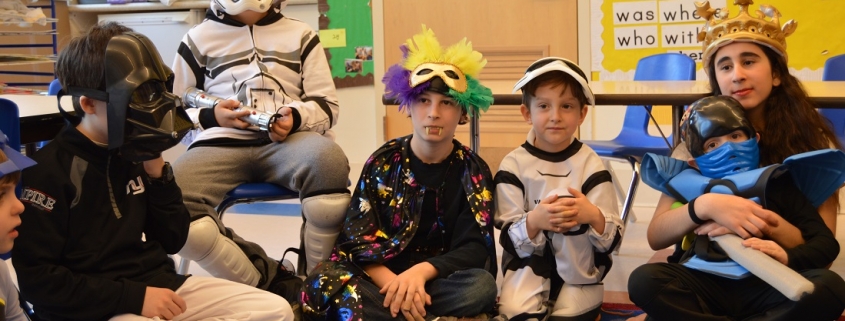25 Mar Purim: Imagining a Better World
We were shaken again by the news of terror this week in Brussels. As I participated in reading מגילת אסתר, the Book of Esther, I was struck that the messages of the ancient book and of the Purim holiday resonate so powerfully still today.
The story of Esther is one of role reversals and changes of circumstances. The story starts with the Jewish people at the mercy of capricious, all powerful rulers who decide whole people’s fates over drinks. And the climax of the story is the moment when the plot turns, and the evil Haman is forced to lead his nemesis, Mordechai the Jew, through the streets dressed in royal clothes. In the end, the Jews defend themselves against their attackers and prevail.
All of this seems in contrast to much of Jewish history, when the all too stark reality was closer to the beginning of the story in which Jews found themselves oppressed and attacked. This is the power of Purim. On Purim we imagine a world better than it is. We have a topsy turvy day, in which good always prevails over evil and reality is overcome by the joy of the moment. To me, the message of the charade is more than silliness for fun’s sake. Celebrating Purim is an act of defiance and commitment in the face of rising evil. We learn that even when things in the world seem bleak, we can and should aspire to a better time; a time when our joyous noise will blot out the words of those who spread hate.
In the face of hatred, at Schechter Manhattan we teach our students that every human being is created בצלם אלהים, in the image of God, and as such each person needs to be accorded the positive regard that such holiness calls for. We emphasize building a community founded on menschlichkeitand our obligation to reach out and help other people. We aspire for our graduates to internalize these values and go out to do good in the world. Our students’ acts of loving kindness will drown out hatred even more loudly than our Purim noise making.
Celebrating Purim this week was a prayer. We prayed that the people of Brussels will not know more suffering. We prayed that good people will rise up together to stand up for what is right. We prayed for a better time, when we will not mourn any more lives lost in terror attacks. Sadly, the world is still in need of much repair and the lessons of Purim are as poignant as ever.
Benjamin Mann
Author’s Chair
THIS WEEK WE ARE FEATURING WORK BY SOME OF OUR STUDENTS IN KITAH ALEPH, KITAH GIMMEL, KITAH HEH, AND KITAH ZAYIN.
Kitah Aleph students have been reading poetry. Here are some of their own poems.
Teeth by Orli
I once had a mouth
full
of
teeth.
and there
was a theif.
who went to sleep.
who stole
my teeth.
that’s why I had
No Teeth.
When Dad Went to north caralina. by Natan
Dad
Went to
north
Caralina.
I mist
Dad in
north
Caralina
When he came
bak he gave
me a hug
If I wes in charge of the world… by David
I would mack [make] teetchers soo meen,
I wauld serv Chickin
Thats aradell [already] eatin.
No roovs [roofs] on School
Be cos I’m not in School!
If I Was Flat Stanley by Yonah
If I was Flat Stanley…
I would mail myself to school!
If I went home…
I would not use a key!
I would tuck my self under the door!
If I was playing hide and seek you would not be able to find me.
If I was flat Stanley.
After the students of Kitah Gimmel learned about the story of Akedat Yitzhak, the sacrifice of Yitzhak, they examined the textual evidence and created a mock trial, arguing whether or not Avraham was guilty of attempting to kill his son.
Click here to read the trial transcript.
–Yoav M., Hannah F., Nathaniel F., David W., Arielle S., Annabelle A., Abby T., Nina G., Simon M.
Kitah Heh is studying historical fiction focusing on immigration stories. In book clubs, students posed questions about the text as they read. They discussed the questions within their groups. Below is a selection of the questions they developed.
Shooting Kabul by N.H. Senzai
- Does Fadi understand the message from the imam?
- Will Fadi get angry again?
- Is Fadi going to take a new photo?
- Will Fadi take Ann if he wins?
- Will Noor or the family help Fadi?
–Jared
Esperanza Rising by Pam Munoz Ryan
- What are potato eyes?
- Why were they quiet when they heard Isabel’s breath?
- What does it mean by tasting the Earth?
–Maya
Esperanza Rising by Pam Munoz Ryan
-
- WHy does Miguel want to see Esperanza?
- Who stole the money orders from Esperanza?
- Why didn’t Isabel win queen of the May?
- Why was Abuelita so dirty and looked like ghost?
- Why was everyone so surprised to see Abuelita?
–Sarah
The students of Kitah Zayin have been working on their Rube Goldberg simple machines. Rube Goldberg Machines are contraptions, inventions, or devices that are made of a combination of simple machines (lever, pulley, wheel and axle, wedge, pulley, and screw). They are meant to accomplish a simple task in a complicated fashion including many of the simple machines in the invention. You’ll see this in our examples with many steps needed to accomplish the tasks of dipping the karpas and breaking the matzah.
Below are our two submissions to this year’s Pesach themed Rube Goldberg machine competition hosted by RAVSAK and the Technion (Israeli Instittute of Technology). Click here to see all about the competition.
Click here to watch Raphy, Annie, and Henry’s “Just Dip It” machine.
Click here to watch Asher, Ben and Hannah’s matzah splitting machine.



